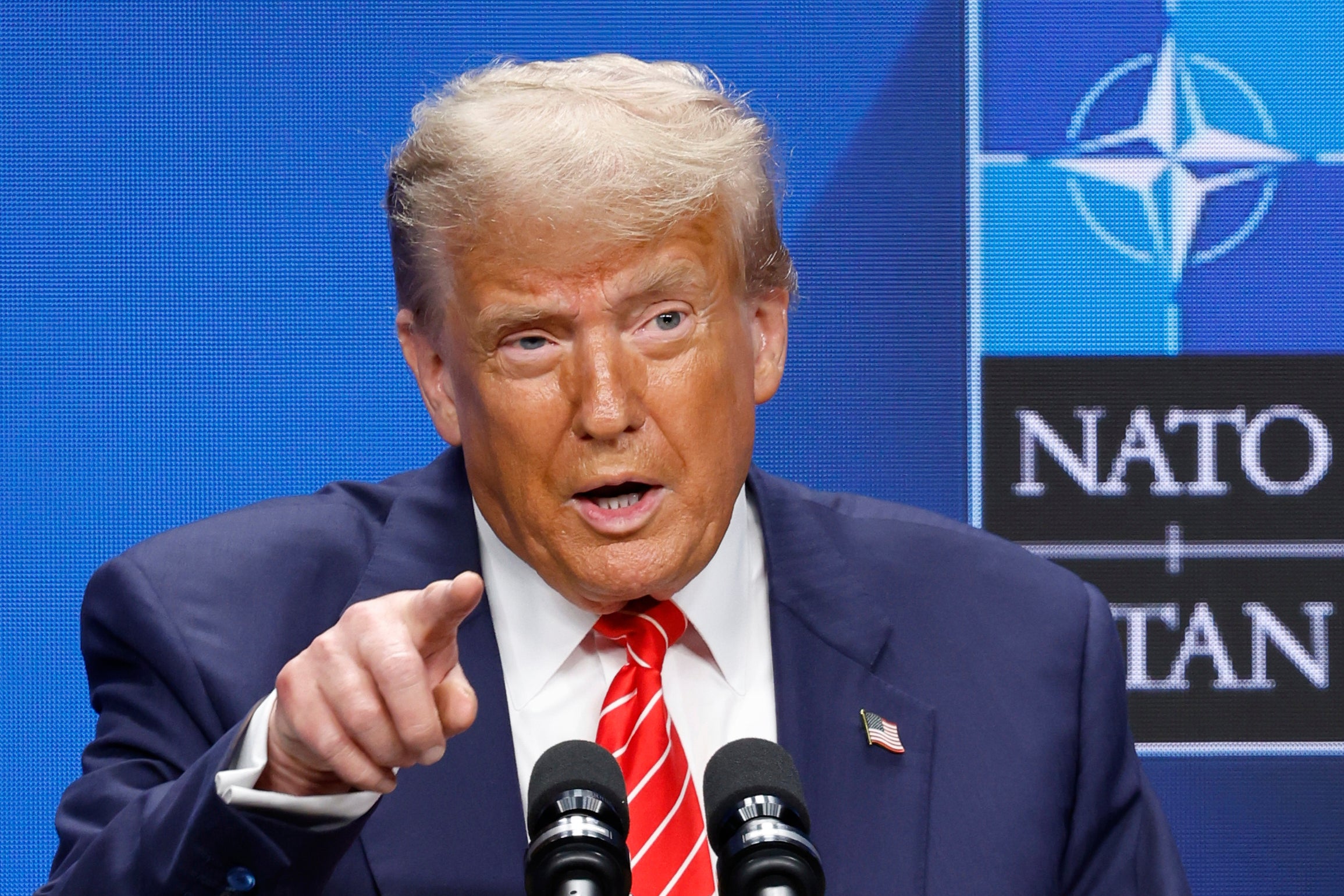European leaders in Nato have agreed to a historic increase in defence spending to 5 per cent of GDP – and praised Donald Trump for driving the uplift.
Secretary general Mark Rutte fawned over the US president for intervening in the conflict between Iran and Israel, likening him to a “daddy” figure overseeing two warring sides and calling the US president “a man of strength” for piling pressure on allies to put more money into security against a backdrop of worsening global tensions and the war in Ukraine.
The new spending pledge – 3.5 per cent of GDP on core defence by 2035, and 1.5 per cent on security and resilience measures – was described by Mr Trump as a “monumental win” for the US, Europe, and “Western civilisation”.
He said Nato allies had shown an “unbelievable” love for their countries, conceding that the alliance is no longer a “rip-off” for the United States after having previously berated his fellow members for not contributing enough.

“They want to protect their country and they need the United States,” he said. “I left here differently. I left here saying that these people really love their countries, it’s not a rip-off, and we’re here to help them protect their country.”
At a news conference, Mr Rutte told the president: “You made this possible.”
Mr Trump had likened the fighting between Iran and Israel to children quarrelling. “They’ve had a big fight, like two kids in a schoolyard. You know, they fight like hell, you can’t stop them. Let them fight for about two to three minutes, then it’s easy to stop them.”
Weighing in, Mr Rutte added: “And then Daddy has to sometimes use strong language to get [them to] stop.”
Mr Trump, who launched strikes on three nuclear sites in Iran last week, likened the impact of what he had done to that of the bombing of Hiroshima and Nagasaki at the end of the Second World War.
Sir Keir Starmer said the Nato summit had sent a “decisive message to aggressors”. The prime minister, who also announced the purchase of a dozen new nuclear-capable fighter jets, said Britain was on track to spend 4.1 per cent of GDP on defence by 2027.
He insisted his position on Russia has not changed, despite Nato failing to condemn Vladimir Putin’s war in Ukraine in the summit’s closing statement.
A communique referred to Nato unity “in the face of profound security threats and challenges, in particular the long-term threat posed by Russia to Euro-Atlantic security”, and reaffirmed support for Ukraine, but it did not explicitly condemn the Russian invasion.
Mr Trump, who met with Ukrainian president Volodymyr Zelensky on the sidelines of the summit, has historically taken a softer approach towards the Russian president than have other Western leaders in his attempts to negotiate an end to the war.
But asked whether the US president had not wanted Nato to condemn Putin in the summit’s concluding statement, Sir Keir said: “The position in Nato has not changed, nor has my position changed. In fact, over the last couple of days, I would say ... there’s been a real resolve, but now is the time to push again, to get Putin to the table for the unconditional ceasefire.”
Sir Keir also insisted that Mr Trump remains a reliable ally, saying that his own team is “constantly” talking to the White House as “we have done for many years”.
It came as the US president said he would consider supplying Ukraine with more Patriot surface-to-air missiles, which are highly effective against Russian ballistic missiles and drones and are essential in defending critical civilian infrastructure.
“We’re going to see if we can make some available – you know, they’re very hard to get; we need them too. We were supplying them to Israel and they’re very effective,” he said.
Mr Trump also reaffirmed his commitment to the collective defence of Nato allies, having poured cold water on it at the start of the summit. He told reporters on his flight from Washington that mutual aid would depend “on your definition” of Article 5.
But on Wednesday, he said: “I stand with it; that’s why I’m here. If I didn’t stand with it, I wouldn’t be here.”
Britain has announced plans to provide 350 air defence missiles to Kyiv, funded by £70m raised from the interest on seized Russian assets.
Ministers also announced that Britain will purchase at least a dozen new F-35A fighter jets, reintroducing a nuclear role for the Royal Air Force for the first time since the Cold War.
It marks a major ramping up of Britain’s nuclear capabilities in the face of escalating global instability, and comes alongside the UK’s decision to join Nato’s dual-capable aircraft nuclear mission – an aircraft-sharing agreement among the allies.
The purchase, hailed by ministers as the “biggest strengthening of the UK’s nuclear posture in a generation”, comes after a major new government review warned that the UK must prepare for the possibility of a “wartime scenario” on home soil.
Iran-Israel latest: Trump compares US strikes on nuclear sites to Hiroshima bombing
Trump says he will look at giving Ukraine more patriot missiles
Trump responds to Nato head’s ‘daddy’ remark: ‘I think he likes me’
CNN anchors denounce Trump’s claims that network’s Iran coverage disparaged soldiers
Starmer warns Labour welfare rebels to ‘read the room’ as Rayner finally backs the PM







